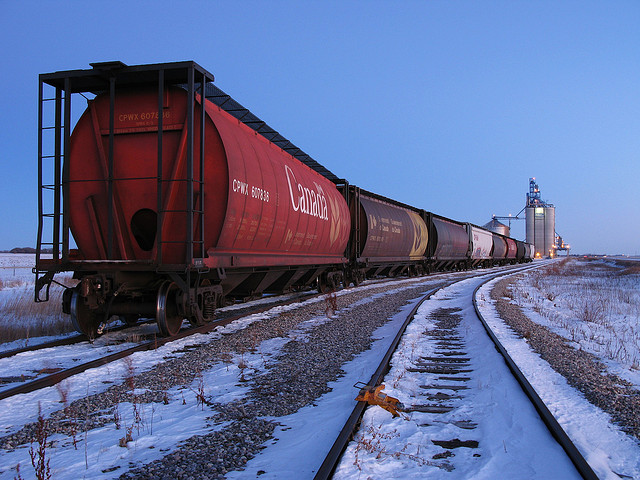Problems in getting wheat to market may not be a top-of-mind issue for Canadians living east of the Prairies, but could have a significant impact on the next federal election.
As western farmers wait and wait for Canada’s rail companies to ship their grain, falling prices have largely wiped out profits from this past year’s bumper harvest. Prairie politicians — including Conservative premiers Alison Redford and Brad Wall — have begged the federal government for months to act, warning about the grain transportation crisis.
The Harper government finally acted on Friday, March 7. Agriculture Minister Gerry Ritz and Transport Minister Lisa Raitt jointly announced a federal order-in-council requiring rail companies to double the amount of grain they are moving (to at least one million tonnes per week) or face a fine of up to $100,000 a day.
Liberal MP Ralph Goodale’s article in iPolitics, “How a broken democracy caused a grain crisis,” analyzes the federal government’s handling of Bill C-52, the Fair Rail Freight Service Act, in 2012. Goodale describes amendments proposed to the Act during Parliamentary committee hearings that would have clearly defined services provided by the railways, created objective measures of the railways’ performance, and paid damages to shippers if railway performance fell short.
But, Goodale says, the Parliamentary Secretary to the Minister of Transport manipulated the hearings: “No Conservative was allowed to think or act or speak for themselves. Like trained seals, they all just read from canned notes prepared in the Prime Minister’s Office. Their questions invariably favoured the railways. All the votes were whipped. And each of the shippers’ ideas was shot down in flames.”
The result, Goodale says: “a dysfunctional grain handling and transportation system which is costing farmers about $5 billion this year in higher expenses, lost sales and deflated prices.”
When Bill C-52 passed third hearing on May 2013, NDP and Liberal members criticized the Conservatives for having failed to consider amendments. NDP MP Niki Ashton said, “Western Canada and the industries in our region depend on rail service. Clearly we have heard from stakeholders that they are getting a raw deal and that the government can do better. Yet, instead of taking the opportunity to listen to important stakeholders, whether in the grain industry or mining, we have been left with a half-baked bill and an approach that certainly does not represent the best interests of western Canadians.”
NDP MP Pat Martin points out that the dismantling of the Canadian Wheat Board also contributed to the crisis. He said, “The Wheat Board not only got farmers the best prices, but they organized the orderly shipment of grain every year.” Western grain producers had warned of looming problems when the federal government eliminated the Wheat Board without considering or developing a plan for grain transportation.
Asked why his government decided to introduce an order-in-council imposing fines, Agriculture Minister Gerry Ritz said the railways had “dropped the ball” on grain transport. Given that the Harper government’s pro-railway approach to the Fair Rail Freight Service Act set the stage, it seems a bit rich for Ritz to blame the railways now for the crisis.
Conservative MP Pierre Lemieux, federal parliamentary secretary for agriculture, called Friday “a great day for farmers.” Asked by CBC As it Happens host Carol Off whether elimination of the Wheat Board had played a role in the crisis, Lemieux said, “There are very, very, few western Canadian grain farmers who feel that the single-desk monopoly of the Wheat Board was helpful to them.” He added, “Farmers have tasted marketing freedom and they love it.” As proof, he asserted that farmers had sowed an additional 2 million acres of wheat in 2013.
Whether or not Lemieux’s figure of 2 million acres is correct, it is clear that farmers plowed large areas in the Prairies to grow more wheat last year. Now they can’t get it to market. Rail companies that are busy hauling tar sands oil have little motivation to ship grain without the Wheat Board as a single large customer breathing down their necks.
Will fining the rail companies solve the crisis?
A March 8, 2014 editorial in the Saskatoon Star Phoenix says “This won’t get grain shipments back on track.” It quotes CP Rail CEO Hunter Harrison as saying, “It’s like adding more cars to a highway at rush hour — everything moves that much slower.” The editorial also cites a Wheat Board study (released just before it was gutted in August 2012) that found Prairie farmers were overpaying as much as $275 million a year for crop transport compared to what is fair under federal law. The newspaper editorial calls Friday’s announcement “incomprehensible,” adding that it only constitutes a great day “from the lofty heights of Parliament Hill.”
Significant financial losses to western Canadians through mismanagement of rail transport have tarnished Conservative claims of being sound managers of the economy. It remains to be seen if this will translate to fewer Conservative ridings in 2015.
Ole Hendrickson is a forest ecologist and current president of the Ottawa River Institute, a non-profit charitable organization based in the Ottawa Valley.
Photo: Chris Campbell/flickr



